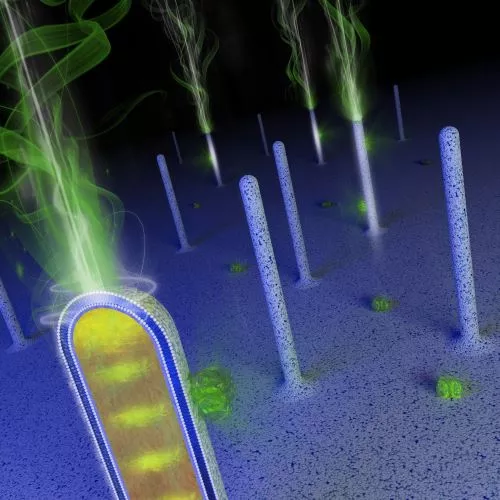PhD project: Biosensing with nanowires
Biomarker detection by optical sensing with nanowires
Introduction
The research at the Division of Solid State Physics focuses around different aspects of semiconductor physics, ranging from materials science to quantum physics, to different applications. The division also leads NanoLund, the major interdisciplinary research environment within nanoscience and nanotechnology at Lund University. Lund Nano Lab is a central key facility for fabrication of material and devices on the nanoscale. The division is also heavily involved in the undergraduate education, especially within the “Engineering Nanoscience” program.
A significant part of the research at the division is in the area of nanobiophysics, where we develop novel methods for investigating biological systems, or to use nanostructures for precision diagnostics. Among other projects, we coordinate an interdisciplinary research environment financed by the Swedish Research Council, which develops methods for single-molecule detection with the aim to detect biomarkers for example for cancer. The project takes place in close collaboration with scientists from the medical faculty and from Chalmers University.
Information about the Division of Solid State Physics
Heiner Linke's personal page and contact information
The progress achieved so far is published in this article: Single-Molecule Detection with Lightguiding Nanowires: Determination of Protein Concentration and Diffusivity in Supported Lipid Bilayers, Verardo et al, Nano Lett. 2019, 19, 9, 6182-6191
https://pubs.acs.org/doi/pdf/10.1021/acs.nanolett.9b02226
Work duties
The project’s aim is to develop techniques for optical detection of single molecules using wave-guiding nanowires. The molecules can be DNA, RNA or proteins that are biomarkers, for example for cancer. The project’s focus will be to develop and improve, based on fundamental physical principles, the optical and biocompatible properties of the nanostructures, and to test them together with other scientists in the project. Methods may include growth of nanowires, modelling, fluorescence microscopy, bioanalytical or biochemical methods, chemical surface modification, and image analysis.
The main duties of doctoral students are to devote themselves to their research studies which includes participating in research projects and third cycle courses. The work duties can also include teaching and other departmental duties (no more than 20%).
We have a large network of international cooperation partners and the PhD studies and an internship in a company or at a research institution abroad can also be part of the expectations.
The doctoral student is expected to work independently, as well as in close collaboration with researchers carrying out other tasks within the project.
Desirable skills
The undergraduate studies should include courses in physics. The research is to a large extent interdisciplinary, such that a broad competence in relevant areas of surface- or biochemistry, biophysics, semiconductor physics, and synthesis and fabrication of nanostructures is valuable. Also valuable for the PhD student position is experience and skillfulness in experimental work, in particular in nanofabrication, microscopy, image analysis, surface chemistry and biochemical methods. Important personal qualities are, beside creativity and a curious mind, the ability to work both independently and in a group, self-motivation and experience in the scientific interaction with researchers from other disciplines and in other countries.
Enrolment: Physics
Subject curriculum for physics at the Faculty of Engineering TEFAFF00 (pdf, 265kB, new window)
Supervisor
Heiner Linke, Professor at Solid State Physics and Director of NanoLund
Positions in the 1st call
The call was open from 23 March until 4 May 2020. Of the ten PhD students that were successfully recruited in this call, eight are eligible for GenerationNano funding.
- Smart nanomaterials for green-tech applications
- Characterization of nanostructured magnetic materials
- PhD project on information as fuel
- Photon detection & sustainable energy
- Ultrafast spectroscopy for new solar energy solutions
- Biomarker detection by optical sensing with nanowires
- Morphology and virulence among bacteria
- Multiscale biomechanics from molecules to cells in cancer
- Solubility of amyloid beta peptide (up to two positions)
- Nanoparticles in the brain: multitalented drug carriers to target neurodegenerative disease


